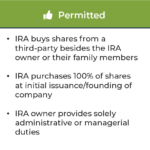 Welcome back to the 237th episode of the Financial Advisor Success Podcast!
Welcome back to the 237th episode of the Financial Advisor Success Podcast!
My guest on today's podcast is Brittany Anderson. Brittany is the President and Partner at Sweet Financial, a hybrid RIA in Fairmont, Minnesota that manages $860m in assets for 1,100 households.
What's unique about Brittany, though, is that she joined Sweet Financial directly out of college as a client service associate, and in the 15 years since, has moved progressively through the ranks, ultimately taking on the role of COO and now becoming the firm’s president and one of its owners.
In this episode, we talk in depth about how Sweet Financial has been able to steadily grow towards the $1 billion milestone despite being located in a rural Minnesota town with a population of just around 10,000, how Brittany’s firm hires new team members into salaried support roles so they can develop and learn within the firm’s culture (staying in those positions for as many as five years before becoming advisors and only then starting to gradually assume lead roles on client relationships), and how Brittany is able to recruit talent to work in a small town by treating job ads as marketing pieces and seeking to attract good cultural fits first and foremost (and then working later on teaching the technical skills).
We also talk about how Brittany and Sweet Financial concentrate on four main business development channels, including creating dedicated platforms to help women who are navigating major life transitions and to advise business owners on building culture and growing their businesses, how Brittany has implemented the Entrepreneurial Operating System as a means to set a three-year vision in order to keep the firm systematically and deliberately moving forward, and how it’s that EOS-driven three-year vision that acts as a filter through which Brittany examines various business opportunities and initiatives, to ensure the firm is only pursuing those which move the firm towards the vision that’s been set.
And be certain to listen to the end, where Brittany shares how she’s eschewed trendier marketing channels and instead has found continued success with longer-term drip email campaigns (noting that the key to staying at the top of prospects’ minds is wholly reliant on consistency), the challenges that Brittany faced as she transitioned out of the boots-on-the-ground operations role to become the leader of the firm with a responsibility to direct, inspire, and lead her team into action, and why Brittany feels that, with women controlling more wealth in the country than ever before, there’s never been a better time for women, in particular, to come into the financial advice industry and serve women of wealth from a female perspective.
So whether you’re interested in learning how Brittany and Sweet Financial have generated such impressive growth in a small rural town, about her journey from intern to President of her company, or how she leverages email drip campaigns, then we hope you enjoy this episode of the Financial Advisor Success podcast, with Brittany Anderson.








 Welcome back to the 236th episode of the Financial Advisor Success Podcast!
Welcome back to the 236th episode of the Financial Advisor Success Podcast!

